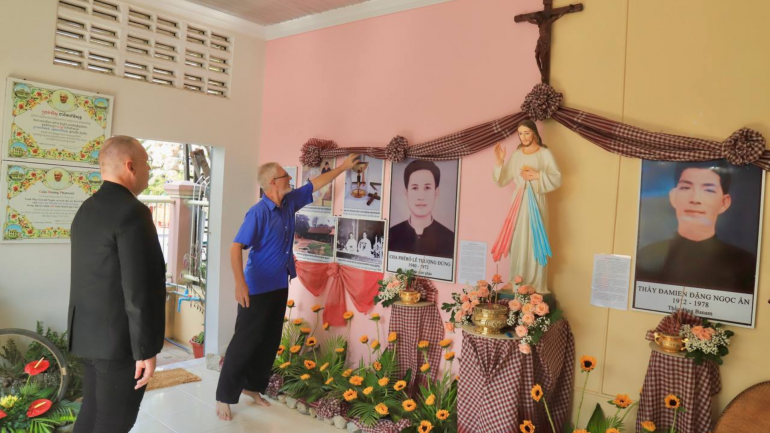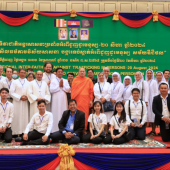Cambodia: Oldest parish in Kampong Cham Prefecture celebrates 160th anniversary

On May 14th, bishops from three Cambodian dioceses led the closing ceremony for the 160th anniversary of Neak Leung parish's founding in Village 6, Prey Veng Province.
Established in 1863, Neak Leung Parish is the oldest in the Kampong Cham prefecture and is located roughly 70 km from the capital city, Phnom Penh.
In his sermon, Olivier Schmitthaeusler, the Bishop of Phnom Penh, said that Catholics have spent the year in prayer, contemplation of their faith, and remembrance of their Christian duties.
"We must not only reminisce about our Catholic ancestors’ lives, but we must also reminisce about our Christian life today and decide to continue to maintain our faith and hope, especially to continue to show mercy to others," he said.
He elaborated on the significance of having an open mind and heart toward God as a defining characteristic of one's faith.
"Open our hearts to God to love God more and more," the prelate said. "We should open our hearts to our fellow Christians to make our community a holy family of God. Let us learn how to create a community that loves each other with all its strength, all its mind, and all its faith."
He reminded the faithful presence that the most important discipline is that God loves us, which guides our lives to be with God and bear fruit.
Bishop Olivier said that the Neak Leung community has witnessed priests Peter Le Thuong Dung and Brother Damien Dang Ngoc Aing as great examples of Catholic life today.
Born in Neak Leung in 1940, Fr. Dung received his Catholic priestly ordination and served in the Kdol Leu parish, situated approximately 150 km away under the Kampong Cham prefecture. People missed him during Cambodia's civil war in 1972, but the faithful understood that he had died like any other priest.
Br. Damien Dang Ngoc Aing was born in Banam village in 1912. He belonged to the Holy Family congregation. He worked in Kampong Kor, Meat Krasat, Ta-Om, Chamnom (under Battambang prefecture) and Kampong Cham.
He cared for others, especially young people and children, and he translated many Latin songs into Khmer to teach the faithful to praise God in their language. Both of them are Vietnamese.
Bishop Olivier emphasized that one's faith should serve as an example, constantly connecting us to God and His will. The two loved and dedicated themselves to serving others in God's name, and they went deep into the lives of the Cambodian people.
The prelate said that although Brother Damian went to Taing Kok-Kampong Thom province, he lived with the Cambodian people and served them there. This is a way to help us find a new path. Loyalty and brotherhood between Vietnam and Cambodia are a special example.
On the same day, Bishop Olivier received a special privilege on behalf of Pope Francis to bless Catholics who attended this ceremony with Apostolic Blessing.
According to the priest in charge, Gerald Vogin, on April 28, to receive this blessing, the community organized a program for each Catholic to implement five important things: First, before or after the feast at the end of the 20th day, they must meet with the priest to confess.
"Second, refrain from sinning before or after the 20-day closing ceremony. Third: Together with the Pope, pray for the whole world. Fourth: Join the 9-day retreat to prepare before the festival. And 5th: Participate in the closing ceremony Eucharis of the 160th anniversary and receive this special blessing," said the priest.
At present, the Neak Leung parish, which is home to the Holy Family church, has 1,300 Christians, the majority of whom are businessmen.
The parish also provides student shelters for students to study in public schools, teaching Khmer literacy, prayer groups, choirs, Vincent de Paul groups, and liturgy groups.
The Catholic Church in Cambodia was founded in the 16th century by the Portuguese priest, Gaspar da Cruz, a Dominican (1520–1570).- Kagnha Keo
Radio Veritas Asia (RVA), a media platform of the Catholic Church, aims to share Christ. RVA started in 1969 as a continental Catholic radio station to serve Asian countries in their respective local language, thus earning the tag “the Voice of Asian Christianity.” Responding to the emerging context, RVA embraced media platforms to connect with the global Asian audience via its 21 language websites and various social media platforms.














